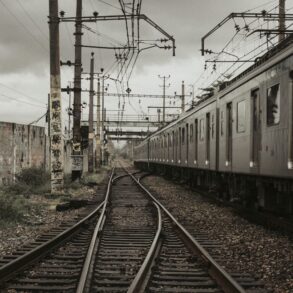The 27th of October 2018, in the Hambach mine, western Germany. What seems like an endless wave of white is sweeping across the Rhineland coal field. In the past days, busses, trains and shared cars have brought thousands of activist from all over Europe who stand together sharing one aim; system change, not climate change. The last years, concerns about our climate and environment, and the discontent with world leaders failing to take action, has taken a constantly growing number of people to the streets – for some, this has even taken them across borders.
The Hambach Forest (Hambacher Forst, Hambacher Wald) was the topic of an recent article in the Perspective Magazine’s third edition of 2018. The article Hambi Bleibt: activists´ struggle for climate justice put a spotlight on the immense actions made to conserve the forest situated in the Rhineland. The German energy company RWE´s massive open-pit mine is demolishing everything in the way of mining lignite, brown coal – including the Hambach Forest.
Since 2012, activists have occupied the forest in hope of saving what remains of the once vast and diverse nature area. The action has become known as “Hambi Bleibt”, or “Hambi stays”. Although the planned clearance of the remaining forest is legally suspended, activists are not planning on leaving anytime soon and believe that there is still a long journey to justice.

On October 8th, the much dreaded report on climate change by the UN Intergovernmental Panel was released. The results are warning, and call for urgent action. Later that month, from October 25th to 29th, over 6000 people gathered for a non-violent mass action of civil disobedience in the Rhineland coalfield. The activists, all wearing white dust-suits, blocked the mining operations and coal infrastructure around the Hambach mine. The message was clear, “Ende Gelände” – here and no further.
Ende Gelände is a German civil disobedience movement working to stop the extraction of fossil fuels. Civil disobedience is used as a strategy to stress that ordinary people are ready to disobey the law to prevent injustice. Since 2015, the network of people and movements composing Ende Gelände have organized civil disobedience actions to push for immediate coal-phase out in the Rhineland coalfield. Every year the movement has been growing. The 2018 action has been claimed the biggest action of civil disobedience against lignite mining ever, and although the future of the Hambach forest is still uncertain, the growth and awareness of climate justice is being celebrated.

Hambi Bleibt has become a symbol of resistance, and the occupation of the forest as well as the Ende Geände movement has gained vast attention and support. Leading up to the mass action, local movements across Europe formed working groups and held information meetings on the upcoming event and its aim. Also in Sweden organizations and platforms spread the word through social media and planning events. Like previous years, busses were arranged to take activist across geographical and legal borders in order to participate in creating new boundaries for environmental degradation. For one of the activists taking the literal journey to raising awareness of climate justice it is not about place but rather the cause. Being active in local movements for climate justice has made her aware of the importance of direct action. She has had knowledge of the mass action since it started and had the possibility to go this year.
The activist has chosen to stay anonymous, because as she states, “It doesnt matter what your name is and where you are from, participating in the mass action means becoming a part of a community of people who all believe in the same change.”

When faced with the criticism that motivation to participate in such mass mobilization and action is merely for the social aspect she opposes. She stresses that the event was efficiently organized. The atmosphere was serious and people were risking a lot, it was not like going to a festival or a fun event. However, the energy was high and she underlines that conviviality is an integrated part of the change. “Although we had a specific goal, fun is a part of the change –meaningful fun.”
Having the possibility and circumstances to take action is a privilege. The action focused on system change, which puts attention to underlying issues of climate change and injustice. For her, working towards climate justice means being aware of the discriminatory effects of climate change.
“Climate justice is global justice, and the scary reality is that someone else is paying the price for our way of living. Having the advocacy to speak for someone whose voice is not heard holds immense responsibility. I tend to meet this responsibility and go wherever I can give a meaningful contribution and make the communal voice stronger.”
She stresses that going to a foreign country to push for change does not make her an especially good or extremely dedicated activist.
“The point is to not focus on the place. We should all take action everyday wherever we can. If this agency takes you far, you should forget that you might cross borders – you will never be a foreigner because climate justice does not care about nationality, and solidarity should not stop at any border.”
Sissal Dahl




